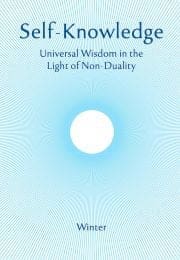The Temple Cave of One’s Own Self
If we consult a dictionary for words that begin with ‘self-’, we will find among the eighty or so entries two main types of word: those which point to certain qualities, and a few abstract nouns suggestive of something deeper. Thus we are reminded of qualities which many would feel are assets, such as self-control, self-sufficiency, self-help, self-defence—all suggesting that we are doing a good job in getting through life. On the negative side, we have words like self-deception, self-conceit, self-righteousness and self-will. There are crossovers and ambiguities; the happenings of life often prompt us to see qualities like self-assertion and self-love with a fresh understanding, and our attitude may change completely.
Turning to words of more abstract meaning that start with ‘self-’, we pass into a less colourful but vastly more spacious terrain. Consider words like self-existence, self-consciousness, self-evident and even the minimalist ‘selfhood’, defined as ‘the quality by virtue of which one is oneself; that which constitutes one’s individuality’. Such brief explanations, which keep self free from finite qualities, are clearly insufficient, and leave us in doubt whether any form of words can lead to inner clarity.
This mystery about the true nature and composition of the self is at the heart of the non-dual philosophical enquiry. The self-realisation that it leads to reveals that not only are we a mixture of qualities supported by a ground that is self-existent, self-evident and self-conscious, but that these abstractions have their true being as the ultimate ‘I’ and that ‘I’ is subtle, boundless and one without a second.
The true nature of the Self cannot be denoted by words, and is itself nameless and formless. And yet, as our examination of the self- words indicated, Self cannot be other than self-conscious, self-existent and self-evident. But a deeper kind of self-enquiry is necessary in order to realise the Self directly. Self has to be realised as free from attributes, whether these be qualities of character or the more refined and abstract conceptions generated by the mind in its speculations.
The enquiry into what turns out to be the total freedom of the true Self (moksha) is not wholly unfamiliar to reflective Western writers and philosophers. Of particular relevance is a state of being that the poet Tennyson entered into as a result of silently repeating his own name:
Till all at once, out of the intensity of the consciousness of individuality, the individual itself seemed to dissolve and fade away into boundless being.
It was an experience ‘utterly beyond words, yet clear and sure, where death was an almost laughable impossibility, the loss of personality… the only true life’. His poem ‘The Ancient Sage’ confirms that to realise that which is Nameless one must ‘dive into the Temple-cave of one’s own Self, there brooding by the central altar’.
In practice it is hard to realise the inner freedom, because our I-sense seems to be inextricably bound up with the qualities of the mind, whether we feel these are assets or liabilities. Sometimes egoism in the narrow ‘selfish’ sense, seems rampant, and this self-will blocks higher insight. But we are also taught that self, I or ego is the great clue to the indwelling presence of the supreme reality, because of its interiority. When we silently enter the temple cave of our own highest being, looking inwardly ‘beyond personality’, the certainty of that higher nature will manifest. As the dictionary says of self-realisation, it is the fulfilment by one’s own efforts of the possibilities of development of the self.


